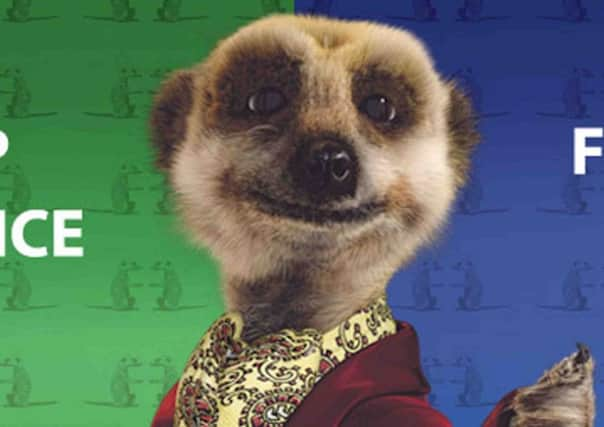Lori Anderson: Meerkat Manor is anything but simples


No, I’m not talking about Mr Grey who last week flexed his whip hand when the first trailer for 50 Shades of Grey was released online. I lost interest in the film when Sons of Anarchy’s hottie, Charlie Hunnam, dropped out to be replaced by Jamie Dornam who looks more Mr Beige to me. No, the heartthrob to whom I refer is the high-haunched Russian oligarch – the only one we are now allowed to love – Mr Aleksander Orlov.
Elegantly attired in a silken smoking jacket and tightly knotted cravat, the star of the “Compare the Meerkat, no Compare the Market” adverts has become a cultural phenomenon in Britain. Since January 2009 when he first appeared on television, Aleksander has not only pushed Compare the Market from 16th to fourth most popular insurance comparison website but also increased the company’s market share by 75 per cent within a year.
Advertisement
Hide AdAdvertisement
Hide AdThe comedy double act between the haughty Orlov and his beloved but downtrodden personal assistant Sergei has made for one of the few adverts I actually look forward to watching as opposed to, like all the rest, actively avoiding. In the early days of my infatuation I’ll even admit to looking up the latest episode online for what was as much a 70-second sitcom as a piece of marketing. Although I must admit that I have recently tired slightly of the pair since the arrival of Baby Oleg, the foundling who appears to have been dropped like a furry – and male – Orphan Annie into their laps to keep their comedic adventures fresh.
Last week, while watching Baby Oleg, I pondered that perhaps he was better off in the arms of an eccentric Russian billionaire than his own mother if recent research by a team at the University of Edinburgh is correct. This was before I reminded myself that they are all but a collection of pixels. For Doctor Matthew Bell at the School of Biological Sciences has reiterated the truth of Alfred Lord Tennyson when he wrote “tho’ nature, red in tooth and claw”.
Meerkats, those adorable denizens of the Kalahari desert, never happier it would appear than when standing upright on a cameraman’s head, are not as benign as we might imagine from repeated viewings of Meerkat Manor, the popular television nature programme. The dominant alpha female Meerkat runs the “mob” or “gang”, as the family groups of between 20 and 50 creatures are known, with an iron talon. When other female meerkats, including her own daughters, are old enough to breed, she may kill them but is more likely to run them off into exile and there are few animals as pitiful as a whimpering meerkat driven to the boundaries and chased off each time she tries to skulk back to her pack. When I saw this once on a documentary, my lip began to tremble.
As part of the research programme by the School of Biological Sciences, 12 groups of adult helper meerkats in the Kalahari were given contraceptive injections which left them unable to reproduce for six months. Over this period of time the alpha female was less aggressive towards her handmaidens, foraged more for food, gained more weight and had larger pups of her own.
Dr Bell said: “The meerkat way of life is a paradox, in which alpha females will attack their daughters, banish them from the group and infanticise their offspring. Our study reveals that dominant animals are worse off when subordinates in their group try to breed, explaining why they brutally suppress others much of the time. We expected this result, but its impact exceeded our expectations.”
The phrase “brutal suppression” doesn’t seem to fit in the same sentence as meerkats, at least not how they have so often been presented to us as furry little charmers. For so much of their lives they display communitarian values and work seamlessly as a team. When foraging for food, one meerkat will seek out the high ground and act as look-out for an hour before being replaced and when danger is spotted, such as a snake or larger predator, they call out to their comrades who quickly scamper back to their hole. The “darker side” of Meerkat Manor presented by Dr Bell and his team is a necessary corrective to the creature’s recent Disneyfication and a reminder that no matter how cute a wild animal looks, its thought processes are utterly alien to us.
If you were to invite a meerkat into your home, better it be the cuddly variety touted most evenings by that charming entrepreneur Mr Orlov. Simples.